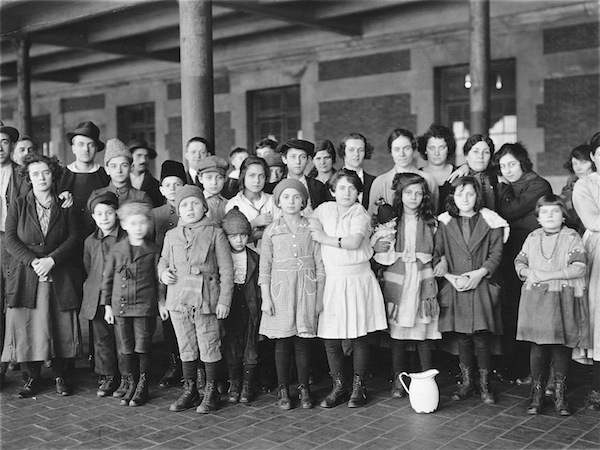Huddled Masses
 Thursday, February 23, 2012 at 11:00AM
Thursday, February 23, 2012 at 11:00AM
 Back in the Dark Days of my first marriage, I hatched a scheme for my Great Escape. Like the plan in the Steve McQueen movie, mine involved getting papiere first. To be exact, I needed the Japanese equivalent of a Green Card, the eijûken (永住権, permanent residence visa/right), which would allow me to remain in Japan and work wherever I liked even after divorcing my wife.
Back in the Dark Days of my first marriage, I hatched a scheme for my Great Escape. Like the plan in the Steve McQueen movie, mine involved getting papiere first. To be exact, I needed the Japanese equivalent of a Green Card, the eijûken (永住権, permanent residence visa/right), which would allow me to remain in Japan and work wherever I liked even after divorcing my wife.
This was over a dozen years ago and at the time I didn’t know many people who had an eijûken.
Rumors abounded. One friend, the unmarried publisher of an English monthly, had gotten his after numerous years promoting the city and region through his magazine. (Apple polisher!) As the owner of a company, he was also the employer of several Japanese. All good things in the fickle eyes of Immigration officers. Another friend, who was running an import and wholesale business, was able to skirt the eijûken visa issue entirely by getting a business visa. Still another friend, a Mexican with a sketchy employment record since coming to Japan, told me the key was having “muchos niños”.[1]
None of these were really viable options for me.
But, then an ex-girlfriend, a woman from Beijing, told me that she had managed to get the eijûken herself.
In addition to being Chinese—the first mark against the poor girl[2]—she was separated from her husband, a no-good sonovabitch whose failed business had left him deep in debt and working in the “water trade”[3] in the city’s seediest part of town, Nakasu.
If she could get an eijûken, I thought, by gum, I can get one, too!
To apply for the permanent residency visa you have to supply the authorities with all kinds of documents—tax returns, proof that you are enrolled in the national health care scheme, and so on, in addition to completing a lengthy form that reads like an overly inquisitive job application. (For details, check the Immigration Bureau’s website.)
The biggest challenge for me was that I didn’t have half of the documents necessary. I went into Immigration, anyways, assuming that I would be denied, but hoping that in my failure to get the visa I would learn exactly what I needed to hand in the next time I applied. To my great surprise and delight, however, they gave me the eijûken on the first go around.
I learned a number of things from this.
The first was the Law of the Ticked Box.
I’ve come across this again and again over the years. Bureaucrats in Japan are a class of people who can’t be bothered to do real work or make decisions on their own, and avoid at all cost doing things without precedence[4]. They will prefer to reject something outright than look into the mitigating details.
A shoe importer recently told me of an on-going headache of his. A shipment of shoes from Mexico had been blocked at Customs. The reason for the delay was that two numbers on the documents did not match. Even though the shoes inside the shipment and those described in the bill of lading were the same, the two-digit discrepancy in numbers meant that the shipment had to be either returned to Mexico or disposed of by Customs. The Customs official, it seems, didn’t want to take responsibility for any unticked boxes on the document he would have to file later.
When I applied for my eijûken I figured that the officials at Immigration weren’t so much interested in the documents I was providing so long as I was providing some kind of document they could put into a file which would enable them to tick a box showing that they had done their job. When in doubt, overwhelm a public official with paper.
As I was for the most part self-employed at the time that I applied and not quite reporting my taxes in full—oops—I didn’t have tax returns. So, I handed in some W-2-like withholding slips (源泉徴収票, gensenchôshûhyô) from the few places where I did piecemeal work—it hardly added up to a respectable salary. As for health insurance, I wasn’t enrolled in the National Health care scheme but I did have a policy with AXA and offered them a copy of that, instead. It must have been the most half-arsed application for an eijûken they had ever come across. And yet, I walked away with a permanent residence visa.
It’s worth pointing out that while I did not have muchos niños—I was childless at the time—I had been living in Japan for about eight years by then, married for three or four of the most recent years, and was on my third spousal visa. Boxes ticky-ticky-ticked!
The second thing I discovered was that officials from one ministry were not communicating with officials from other ministries. In the U.S., if the Bureau of Immigration found an immigrant who hadn’t been paying taxes, they would most likely report him to the IRA. But here? Avoiding taxes does not fall within the purview of Immigration’s authority, so why bother?
 The third and most important thing I learned was that Japan in its own discreet way was ratcheting up immigration. As far as I know, this has not been made public and evidence is still anecdotal.[5] But, where the eijûken, and naturalization, was at one time a rarity among foreign residents in Japan, it seems to have become fairly common, and not only among Westerners, but among Chinese and other Asians, too.[6]
The third and most important thing I learned was that Japan in its own discreet way was ratcheting up immigration. As far as I know, this has not been made public and evidence is still anecdotal.[5] But, where the eijûken, and naturalization, was at one time a rarity among foreign residents in Japan, it seems to have become fairly common, and not only among Westerners, but among Chinese and other Asians, too.[6]
The easing of immigration makes sense as nothing the government has tried so far to increase the birth rate has borne any fruit. Ask the average Japanese, however, what they think about opening the doors to more immigrants and you won’t find too many enthusiastic supporters. Many Japanese believe the very reason their country is safe is the homogeneity of its people. You only have to look at America with all its racial tensions and crime, they say, to see that immigration is not the solution.
But immigration is the solution. It would not only bring in much needed consumers and tax payers, but also young people with the ambition to make the Japanese Dream come true for themselves. Selective immigration could also mean that Japan would be able to invite the best and brightest from all over the world to come study, work, research and invent, reinvigorating the creative and innovating force that Japan has long been. The alternative would be the slow and painful decline of one of the most prosperous modern countries the world has ever known.
[1] The Immigration Bureau offers some examples of successful applicants.
[2] The Chinese are to Japan what the Mexicans are to the United States: virtually personae non gratae, unless they have lots of money to spend once in the country. The slogan of Japan’s immigration should be: Bring us your Coddled Masses . . .
[3] The “water trade” (水商売, mizu shôbai or 水稼業, mizu kagyô) refers to businesses which make their money by entertaining and whose fortunes can rise and fall depending on their popularity with customers and include restaurants, geisha houses known as machiai (待合), bars, and “snacks”.
[4] There is an excellent (though slightly dated) book by Misao Miyamoto called Straightjacket Society: An Insider’s Irreverent View of Bureaucratic Japan, which goes into great detail about this. It is a must-read for serious students of Japan.
[5] Anecdotal in that there sure seem to be a lot more foreigners (both Western and Asian) today than there were twenty years ago. In fact, in 1990 there were about 1 million foreigners living in Japan, the vast majority of them being Koreans (zainichi kankokujin) whose ancestors had come to Japan during the colonization of the Korean peninsula. Today there are over 2 million. In the 18 years leading to 2010, the number of foreigners living in Japan increased 80%. The number of Chinese has more than doubled. (This does not include illegal aliens). For more information, check here and here.
[6] Incidentally, a Japanese-Brazilian woman who was married to a Taiwanese doctor she met while studying at a Japanese university once told me of the hoops she and her husband had to go through to become naturalized. This was well over twenty years ago. It had taken nearly a decade, and untold sums of money “donated” to influential politicians to finally gain citizenship. Their first try had been rejected because of a parking ticket of all things.
 Chinese immigrants to Japan,
Chinese immigrants to Japan,  Japan Immigration Bureau,
Japan Immigration Bureau,  Japanese Green Card,
Japanese Green Card,  Misao Miyamoto's Straightjacket Society,
Misao Miyamoto's Straightjacket Society,  getting an eijuken,
getting an eijuken,  how to get permanent residence visa in Japan,
how to get permanent residence visa in Japan,  immigrating to Japan,
immigrating to Japan,  immigration to Japan,
immigration to Japan,  mizu shobai,
mizu shobai,  population decline in Japan,
population decline in Japan,  zainichi Kankokujin,
zainichi Kankokujin,  永住権 in
永住権 in  Living in Japan,
Living in Japan,  Married Life,
Married Life,  Working in Japan
Working in Japan 